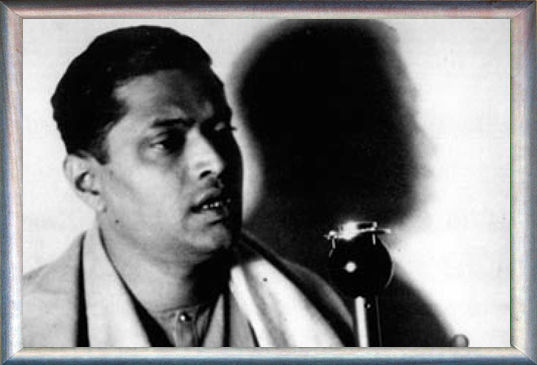Pankaj Mullick was born on 10th May 1905 at Calcutta, India. Pankaj Mullick was son of Manimohan Mullick who had a great interest in traditional music, and would invite eminent singers and instrumentalists to perform during religious festivals. Born in a middle class Bengali family, it was here that Pankaj Mullick drew inspiration from classical Hindustani music. From a very early age, he decided that his vocation would be music, and though enrolled in college, he did not pursue higher education. After completing his college studies he became a student of Durgadas Banerjee. Later, he joined Dinendra Nath Tagore for learning music. His first record was released by the Videophone Company in the year 1926.
Pankaj Mullick was lucky to be introduced to the Tagore family, which was to have an everlasting influence upon him. Rabindra Sangeet became his forte, and he is the only man who has tuned a Rabindranath poem to music, 'Diner Seshey, Ghoomer Deshey' with the great poet's total approval. The approval of the great poet came to Pankaj after endless numbers of hours of waiting on him, and the story has it that it was for a college function that Pankaj had approached the great poet to have his permission to perform one of his poetries, to which Rabindranath Tagore asked him to sing out the composition that he had in mind. It was after hearing his composition that Rabindranath was so very overcome with the tune that he granted him a total approval for all his poetries. Thus was through Pankaj Mullick's songs that Rabindra Sangeet became popular in every Bengali household, even raising great interest among Western music connoisseurs.
Pankaj Mullick regarded the balance and equanimity of the mind as his best asset, providing him with status as a human being and an artiste. Pankaj Mullick enjoyed a very close relationship with AIR (All India Radio) since its very inception in 1928, then a private broadcasting organization. For very many years, his Sunday music lessons had thousands of listeners, specially among young girls. It was at his initiative that the use of the tabla was introduced to keep rhythm for Rabindra Sangeet, which the poet had not previously adopted.
Though not really an actor, even though appearing in some six or seven films, his first experience was in a small role in Chashar Meye. It is interesting to note that when this silent film was being exhibited at Calcutta, Pankaj Mullick would conduct his orchestra to provide background music. Pankaj Mullick and
R. C. Boral supplemented each other on many occasions whilst composing music for
New Theatres' films. One of the Pankaj Mullick's most notable scores was for Mukti in which director P.C. Barua had assigned him a role.
On joining the New Theatres in 1933, he composed music for 'Yahudi ki Ladki'. He assisted
R. C. Boral in Dhoop Chaon (1935), Karorpati and Manzil (1936) and President (1937). His Bengali films include Mukti (1937), Desher Mati (1938), Badididi (1939), Jiban Maran (1939), Nartaki (1940), Doctor (1940), Meenakshi (1942), Dikshul (1943), Dui Purush (1945), Nurse Sisi (1947), Ramer Sumati (1947), Pratibad (1948), Roop Katha (1950), Nabin Yatra (1953), Mahaprasthaner Pathey (1953), Rajkamal (1955), Louha-Kapat (1957), Aahwan (1961) and Bighalita Karuna Jahabi Jamuna (1972).
Pankaj Mullick wrote many books, a few of them are : Geet Valmiki, Swara Lipika, Raga Lakshana Geet Manjari and Mahishasura Mardina. He received the prestigious
Dada Saheb Phalke Award in 1972. He died on 19th February 1978. The first person to reach his residence was
R.C.Boral.

